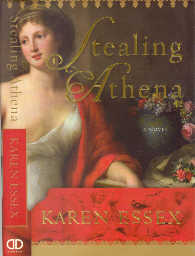This is a double novel; a story of two strong women, Mary Elgin in the 19th Century and Aspasia in
the 5th Century B. C. One was the wife of an ambassador to Turkey in Istanbul and the other a consort of
Pericles in Ancient Greece. One will observe the marble friezes of the Parthenon being taken down and the
other will watch the friezes of the Parthenon being raised into position. Inside of this majestic building and inside
of each woman, the ferocious spirit of the goddess Athena throbs.
Mary is riding the chariot of Phaeton and is slammed to its deck by a lightning bolt of Athena's father
Zeus as the novel lurches into action in its first paragraph:
[page 3] Aboard the Phaeton, 1799
Mary hit the floor of the ship's squalid cabin with dull thud, jolting her awake and
sending a pain so sharp up her spine that Zeus might as well have hurtled a
thunderbolt into her backside. She tried to breathe, but the fetid odors dank wood;
stale, trapped air; foul clothing; and the urine and excrement of humans animals
were unbearable partners with the sickness that went along with the early stages of
pregnancy.
We know immediately we are in for a tumultuous ride of classical proportions, even before
we meet the fiery wench that Alkibiades is taking to Perikles.
[page 50] In the city of Athens, in the fourth year of the Thirty-Year Truce with
Sparta
"I want you to behave meekly, and not at all like yourself," Alkibiades said,
dragging me by the arm at a pace faster than my tall platform shoes would allow me
to walk. "If Perikles sees what you are truly like, he will promptly rescind any offer
to help us."
"Slow down! You are bringing me to him like a slave to market!" I protested.
Aspasia was to be Perikles' wife, but by the time Alkibiades arrives with the Miletus woman, he
discovers that Perikles has passed a law to forbid the marriage of Athenians to foreigners. But Perikles takes
her into his confidence and his heart anyway. How could he not? He discovers that her teacher in Miletus was
as clever as his own when Aspasia asks why Anaxagoras was dependent upon Perikles.
[page 57, 58] "He taught me to reason and to inquire. He showed me and many
others that the mysteries of the world had solid explanations that one might
decipher with enough investigation. The world needs minds such as his. I do not want
to be responsible for the loss of him."
"Oh? I am interested in pursuing theses sorts of inquiries myself," I said.
"Might you give me an example of some of the ideas?"
He looked down at her from position of greater height, skepticism on his face.
"He has demonstrated that the sun is not a god but a very hot rock that is
larger than the Peloponnese. He taught that the universe is not ordered by the whims
of the god, but by a pure intelligence that suffuses all things."
"I believe that he must have been under the influence of my teacher, Thales
of Miletus," I replied. "I am certain that he devised this theorem first."
Later Perikles and Aspasia walk toward the Parthenon and we catch a glimpse of the huge temple
to Athena in the process of construction.
[page 70] We walked down the footpath toward the Parthenon, with great piles of
stone flanking us all the way. The framework of Athena's temple shone through the
black night. The columns and colonnades were constructed, but the rooftop was all
open and the walls had not yet been enclosed.
"The temple will be the most majestic ever built to the goddess and will
commemorate her assistance in Athens's ultimate victory over the wretched
Persians," Perikles said.
And we hear an ominous warning from Perikles to anyone who would dare to steal Athena's treasures
from her temple.
[page 71] "But the goddess cursed them," Perikles said. "Anyone who destroys a holy
image of Athena or dares to plunder her temples will come to a very bad end. That is
her promise. The Persians believed that they had destroyed us, but in fact, in
destroying our monuments, they were merely laying the foundation of their own
destruction."
Mary Elgin, some 2400 years later, visits the same temple to watch as her husband, Lord Elgin, steals
Athena's treasures to transport them to a museum in London. One wonders what fate awaits the modern day
plunderer of Athena's temple. His plunder has the goal of preservation of Athena's treasures by saving them
from being pulverized to recover the lead which holds them together to make bullets. The Turks who govern
the land of Greece care little about preserving the antiquities in situ and are willing to allow Lord Elgin to
remove whatever he wishes. Will this goal of saving the antiquities sit well with the goddess Athena or will she
interpret it as an act of destruction?
While reading this book, I became interested in how Mary Elgin suffered from bouts of asthmatic
choking fits. Here is the first description of her condition.
[page 5] On deck, Mary felt none of the queasiness that had troubled her every
moment during the voyage. It was if the sea air, cooler than it had been for days as
it moved across her face, blew away all her ailments the asthmatic choking disease
that she shared with her husband ( which was how they knew that they were
inalienably meant for each other); the morning sickness, which despite its moniker
knew no time of day in her body; the unrelieved seasickness; and, most incurable of
all, the loneliness she'd felt for her home and for her parents since the day she told
them goodbye.
As I read about the seasickness, I knew that a simple speed trace(1) would have alleviated her distress
while at sea, and if she were a real person, I would have emailed her immediately as I have done for many
people around the world who have asked for help. I have often helped real people with these problems, but
this is my first time wanting to help a fictional person.
In addition, I would suggest that Mary do a speed trace on her next choking asthma symptoms as soon
as they arise. Why? Because the symptoms as described in the novel show the classic signs of a doylic memory
being triggered, that is, some asthmatic choking fit at an age below five years old occurred to Mary, which now
returns at unpredictable times. But she always notices a slight restriction in breathing prior to a full-blown fit
and if she began a speed trace immediately at that time, the asthmatic choking symptoms would cease and
never return. In its place, she will likely recall the original event of asthmatic choking as a toddler.
Since Mary Elgin is a fictional character, the only way I know of to contact her was created by Jason
Fforde in his Thursday Next novels, the footnoterphone. I would get off a message on the footnoterphone right away and to explain to Mary Elgin how to do a speed trace at the first sign of the choking/asthma symptoms.
Once she does that, she will never be bothered by those onerous attacks again. Mary's life would be much
improved, but the novel would suffer from loss of dramatic tension at many places during her sea voyages and
pregnancies which always seemed to coincide with each other. Plus she could show Lord Elgin how to remove
his bouts of coughing, asthmatic attacks, and migraine headache which plague him greatly.
Back in Athens, the sculptor of the statue of Athena which is to loom over human visitors to the inside of the Parthenon,
Pheidias, is explaining to Aspasia how a huge amount of gold will be hammered over the statue, which the
opponents of the expensive project insisted be easily removed in times of need.
[page 166] He shook his head in annoyance at the pettiness of their enemies. "I
prefer to concentrate on the final result, which , as you can see, will be glorious. When
all those fools are dead, Athena will stand(2). She will be assembled, dressed, decorated
with precious gold and jewels and inlays of glass, and present for the lucky few to see.
But all will hear of the majesty of the monument.
Pheidias explains to Aspasia that he wants to use her features and expression as the model for the face
of the goddess Athena. Neither has any idea of the repercussions that this innocent artistic decision will have
on their lives.
Already Aspasia is experiencing problems from powerful men who are whispering ugly things behind
her back. Why, she asks Pheidias, do they seem to fear her more than they do Perikles? His answer is simply,
"There is no sense in asking unanswerable questions, Aspasia." That may be so, but I would daresay that there
are no unanswerable questions, only unanswered questions, and I have found that there is power in allowing
unanswered questions to remain potent in one's mind. Aspasia's answer seems to indicate such power.
[page 167, 168] "But as a philosopher I take it upon myself to address such questions. There is no such thing
as a concrete or satisfactory answer, but one must take comfort in the exploratory path that logical inquiry
offers."
That sounds like something Socrates himself would say, if he were around, which in this case, he is.
He is working as a young man doing sculpting work, but already we see his interest in philosophical matters.
[page 168] "Those are the first words of truth I have heard spoken today," said a
strange voice from behind us.
We turned around to see that a husky young man carrying tools and cloth had
entered the room. He bowed to us and began to polish the long plinth that would
eventually serve as the base of the statue of Athena. He tried to look as if he were
hard at his labor, but I could tell that he wanted to listen to our conversation.
Aspasia, as a native of Miletus, describes her wishes for Pheidias to known for his
great work on the statue of Athena.
[page 171] I hoped that his massive efforts would bring him the acclaim he both
desired and deserved while he was still lucid and living and able to enjoy the
accolades.
Aspasia could be forgiven, as non-Athenian, for not understanding the uniquely Grecian concept of
kleos which is the glory that comes to one from one's work or bravery in battle after one's death. Pheidias
would hope for kleos, not accolades while he was living. Diotima, in a later conversation with Aspasia, puts the case for kleos to her this way:
[page 227] "Do you think Achilles would have died for the love he bore Patroklus if it
had not been foretold that it would bring him immortal fame? Every man is longing for
that endless fame. The nobler the man, the greater his ambition."
A wedge develops between Lord Elgin, who literally lost his marbles, and Mary Elgin, who values
other things more than cold marble slabs. Lord Elgin explains to her that the fate of his marbles are at stake.
[page 294] "I want [an] opinion on whether the marbles should be restored, or whether
we should leave them in their present condition."
"Do you mean at the bottom of the sea?"
He did not smile. "We are the keepers of the world's greatest treasures(3). Does
that mean nothing to you?"
"My children are my greatest treasures," she said. "Stone, no matter how old,
means nothing to me compared to their welfare."
What led me to read this book was that the author herself told me that it was not a romance novel. I
met her in a novel way. I was walking through Octavia Bookstore in uptown New Orleans and saw this woman
standing at a podium by herself in a nearby room. She seemed to be turning pages of a book, so I assumed
that she was reading it to herself. There was no one else in the room, and it seemed a little strange that she
should be standing up reading in a bookstore. As I entered the room, I noticed that she was not reading but
making a note in a book, then setting it aside and picking up another book. She was autographing books.
"Are you the author of this book?" I asked her. A dumb question but it was what came out.
"No," she said, "I just sign her books." I understood her comment. It was funny because no author
would have someone else sign her books. And yet it was true at another level. The woman signing the books
is doing the equivalent of repeatedly writing "I shall not tell a lie" on a blackboard at the command of the teacher. She
was not an author writing original prose, but some automaton doing punishment work as an amateur
P. R. agent.
At one point, she told me, "This is not a romance novel." I suspect she sensed that I was not the
romance novel type. What she said came back to me as I read this passage in her book.
[page 356] Feelings were a minor detail in the every-unfolding drama of her life. This
was not an opera or a romance novel. Mary would contain this man and his ardor,
which had radiated from his eyes. She had managed the feelings of the fantastically
handsome Count Sébastiani, the Capitan Pasha, and other powerful men. Surely she
could manage Robert Ferguson.





